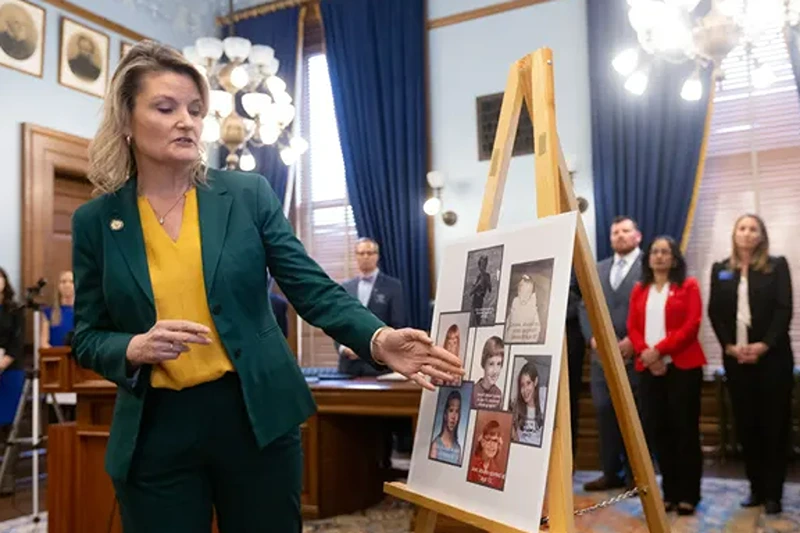
OAN Brooke Mallory
UPDATED 2:18 PM – Tuesday, April 4, 2023
Activists and survivors of sexual assault have fought for years to make it easier to punish abusers and bring legal action against them. Accelerated legislative measures to bring down these abusers, even decades later, are now proceeding quickly in Kansas.
Indecent liberties, aggravated human trafficking, and online sales of child pornography are just a few of the dozen sexual offenses against children that would be subject to the bill’s removal of time restrictions on how long prosecutors have to bring charges against suspects.
It would also give victims of abuse additional time to file lawsuits seeking financial compensation.
The decision to make it simpler to bring civil claims, or criminal investigations, into abuse cases that date back decades has been sparked by an influx of abuse reports regarding Roman Catholic clergy that have surfaced across the country. The Kansas Bureau of Investigation (KBI) said in January that they had identified 188 Catholic clergy members accused of crimes dating back to the 1950s, and had provided prosecutors with 30 affidavits. However, according to the KBI, the lack of criminal charges for these men was largely due to the state law’s time limit on prosecutors’ ability to prosecute cases.
Six days after a committee hearing, the law was approved by the state Senate in a unanimous vote on Wednesday. The House received the proposal, and they are set to vote on it as soon as next week.
“I am sad to say the person who sexually assaulted me is still out in the public and has never been held accountable,” said Earl McIntosh, a 57-year-old Topeka resident who was molested by a teenage neighbor when he was 10 years old. McIntosh was one of the individuals who testified in the Senate committee.
For violent sex crimes against children, other than rape and aggravated sodomy, Kansas prosecutors are currently prosecuting the crime until the victim turns 28, or within a year after DNA evidence identifies the suspect. The bill would essentially remove those limits.
The proposed law would grant abuse survivors up until their 31st birthday, or three years after the abuser is found guilty of a crime involving sexual assault against a kid.
Another idea brought forth by survivors was mandating clergy to alert authorities regarding suspicions of child abuse, however, this was not included in the measure.
According to Child USA, a Philadelphia-based think tank that focuses on laws addressing child abuse, 18 states have abolished their statute of limitations for crimes involving sex with children. According to the association, at least some claims involving child abuse are not subject to a statute of limitations in 15 states.
Survivors and advocates explained to legislators that because of their trauma, which sometimes accompanies extreme guilt, and a fear of retaliation, survivors frequently wait well into adulthood to expose abuse.
In previous years, proponents of Kansas law reform struggled to even secure a hearing for their proposals.
Bipartisan initiatives to alter state law were launched in January. Every day that lawmakers were in session this year, survivors had put up a booth in the Statehouse visitor’s center, which lawmakers had to pass to get to their offices from the parking garage. Senate President Ty Masterson (R-Kan.) met with survivors to discuss the current proposal.
Although some significant figures were neutral on the matter, no one spoke out against the proposal.
The elimination of the $500,000 cap on damages in claims against government entities alarmed a group of insurance providers, who claimed that the increased cost of insurance would force businesses out of the state.
The association for Kansas cities warned that if the law passed, they might have to pay damages “simply because a bad actor chose to commit their crime on city property.”
However, according to a statement from the Kansas Catholic Conference, they agreed that the bill appears to give survivors “more tools in seeking justice.”
“There is no time limitation on when the Catholic Church will offer services and support to clergy abuse victims,” the statement read.
On Wednesday, State Senator Cindy Holscher (D-Kan.) testified in favor of the bill and expressed how, when she was five years old, a man who worked on her family’s farm came close to sexually assaulting her. However, he suddenly heard a loud noise, which fortunately gave her time to escape.
“For years, I didn’t even recognize this as an attempted assault and attempted sexual assault, not until I had my own children. Yes, I kept thinking I did something wrong. My mind keeps trying to shield me from the embarrassment, the shame, the trauma of that day,” Holscher said.
Stay informed! Receive breaking news blasts directly to your inbox for free. Subscribe here. https://www.oann.com/alerts

